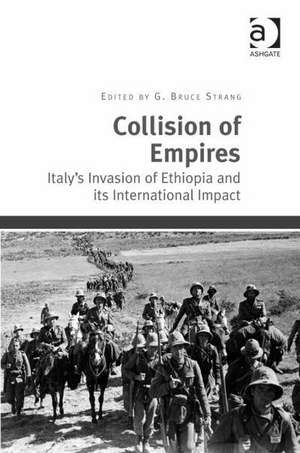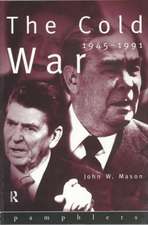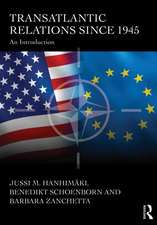Collision of Empires: Italy's Invasion of Ethiopia and its International Impact
Editat de G. Bruce Strangen Limba Engleză Hardback – 24 oct 2013
| Toate formatele și edițiile | Preț | Express |
|---|---|---|
| Paperback (1) | 355.07 lei 6-8 săpt. | |
| Taylor & Francis – 6 feb 2017 | 355.07 lei 6-8 săpt. | |
| Hardback (1) | 1068.91 lei 6-8 săpt. | |
| Taylor & Francis – 24 oct 2013 | 1068.91 lei 6-8 săpt. |
Preț: 1068.91 lei
Preț vechi: 1303.55 lei
-18% Nou
Puncte Express: 1603
Preț estimativ în valută:
204.55€ • 211.34$ • 170.15£
204.55€ • 211.34$ • 170.15£
Carte tipărită la comandă
Livrare economică 19 martie-02 aprilie
Preluare comenzi: 021 569.72.76
Specificații
ISBN-13: 9781409430094
ISBN-10: 140943009X
Pagini: 398
Dimensiuni: 156 x 234 x 22 mm
Greutate: 0.86 kg
Ediția:New.
Editura: Taylor & Francis
Colecția Routledge
Locul publicării:Oxford, United Kingdom
ISBN-10: 140943009X
Pagini: 398
Dimensiuni: 156 x 234 x 22 mm
Greutate: 0.86 kg
Ediția:New.
Editura: Taylor & Francis
Colecția Routledge
Locul publicării:Oxford, United Kingdom
Cuprins
Contents: Preface; Introduction, G. Bruce Strang; ’Places in the African sun’: social Darwinism, demographics, and the Italian invasion of Ethiopia, G. Bruce Strang; The Ethiopian crisis and the emergence of Ethiopia in a changing state system, Ian S. Spears; Philip Noel-Baker, the League of Nations and the Abyssinian crisis, 1935-1936, Gaynor Johnson; ’This silly African business’: the military dimension of Britain’s response to the Abyssinian crisis, Steven Morewood; France and the Ethiopian crisis, 1935-1936: security dilemmas and adjustable interests, Martin Thomas; ’A sad commentary on world ethics’: Italy and the United States during the Ethiopian crisis, G. Bruce Strang; 'The last ditch defender of national sovereignty at Geneva': the realities behind Canadian diplomacy during the Ethiopian crisis, Francine McKenzie; The paradox of peaceful co-existenceâ„¢: British dominions’ response to the Italo-Abyssinian crisis, 1935-1936, W. Neville Sloane; Schreck and schadenfreude: Hitler, German alliance priorities and the Abyssinian crisis, 1935-1936, Geoffrey T. Waddington; An alliance of the ’coloured’ peoples: Ethiopia and Japan, J. Calvitt Clarke III; Soviet appeasement, collective security and the Italo-Ethiopian war of 1935 and 1936, J. Calvitt Clarke III; A way out of isolation: Fascist Italy’s relationship with the Vatican during the Ethiopian crisis, Nicolas G. Virtue; The former European neutrals, the Ethiopian crisis and its aftermath, 1935-1938, Remco van Diepen; Select bibliography; Index.
Notă biografică
G. Bruce Strang is Professor of History and the Dean of the Faculty of Arts at Brandon University, Canada. He lives in Brandon, Manitoba, with his wife Nancy Hennen, and sons Sean and Marc. He is currently writing a monograph assessing Italian foreign policy and reconstruction in the early Cold War Era.
Recenzii
'This collection certainly broadens the existing literature on the crisis. It brings a wide range of international perspectives to bear and helps to explain how the invasion and annexation were able to occur in the face of the international community. Perhaps the most useful aspect of it is the sheer array of new source material it presents to the reader. Archives of 11 different countries ... have been consulted, alongside all the published primary and secondary materials. It is a vital addition for anyone interested in the crisis or in the turbulent international relations of the 1930s in general.' Second World War Military Operation Research Group 'The volume makes a significant contribution, representing by far the most updated and valuable publication currently available on the diplomatic dimensions of the Italo-Ethiopian crisis of 1935-36.' H-Soz-u-Kult 'The strength of Collision of Empires is that it is not limited to standard topics related to the major European powers of the time that were involved in the Italian-Ethiopian conflict of the 1930. Rather it provides analysis on broader international relations issues. As such, it is best suited for students of political science and international relations.' African Studies Quarterly
Descriere
Italy's invasion of Ethiopia in 1935 marked a turning point in interwar Europe. The last great European colonial conquest in Africa, the conflict represented an enormous gamble for the Fascist dictator Benito Mussolini. He faced a challenge not only from a stout Ethiopian defence, but also from difficult logistics made worse by the League of Nations' half-hearted sanctions.










